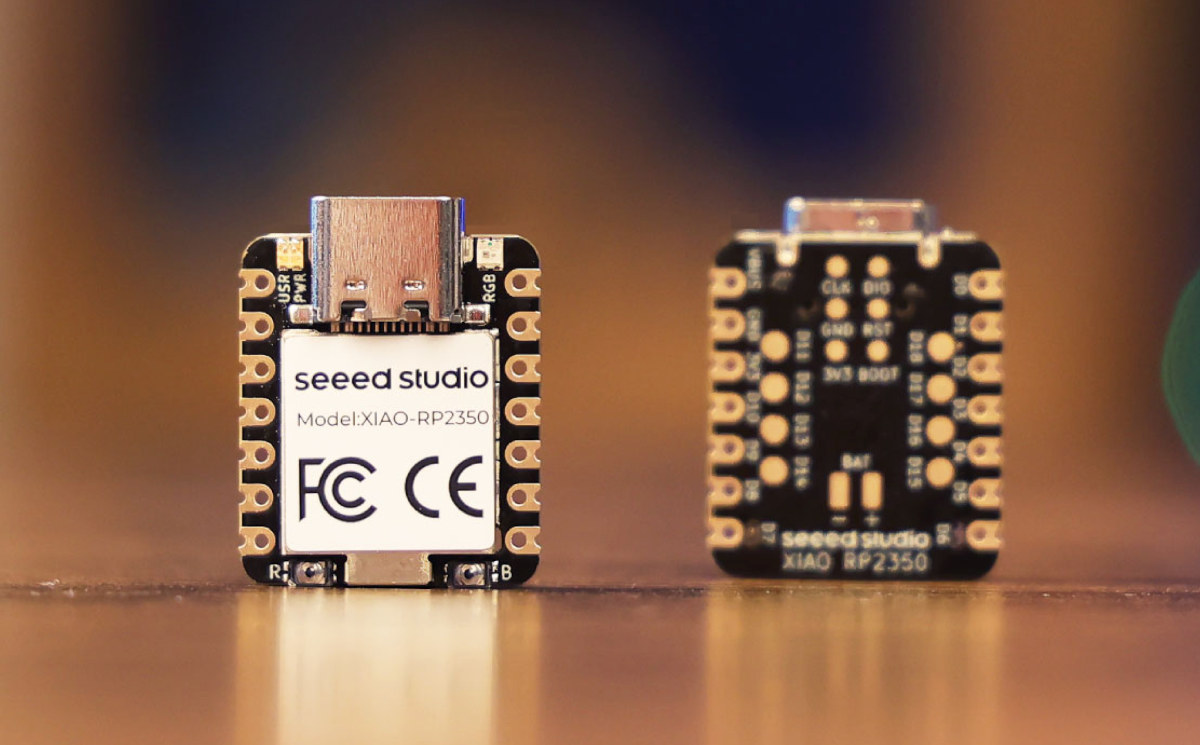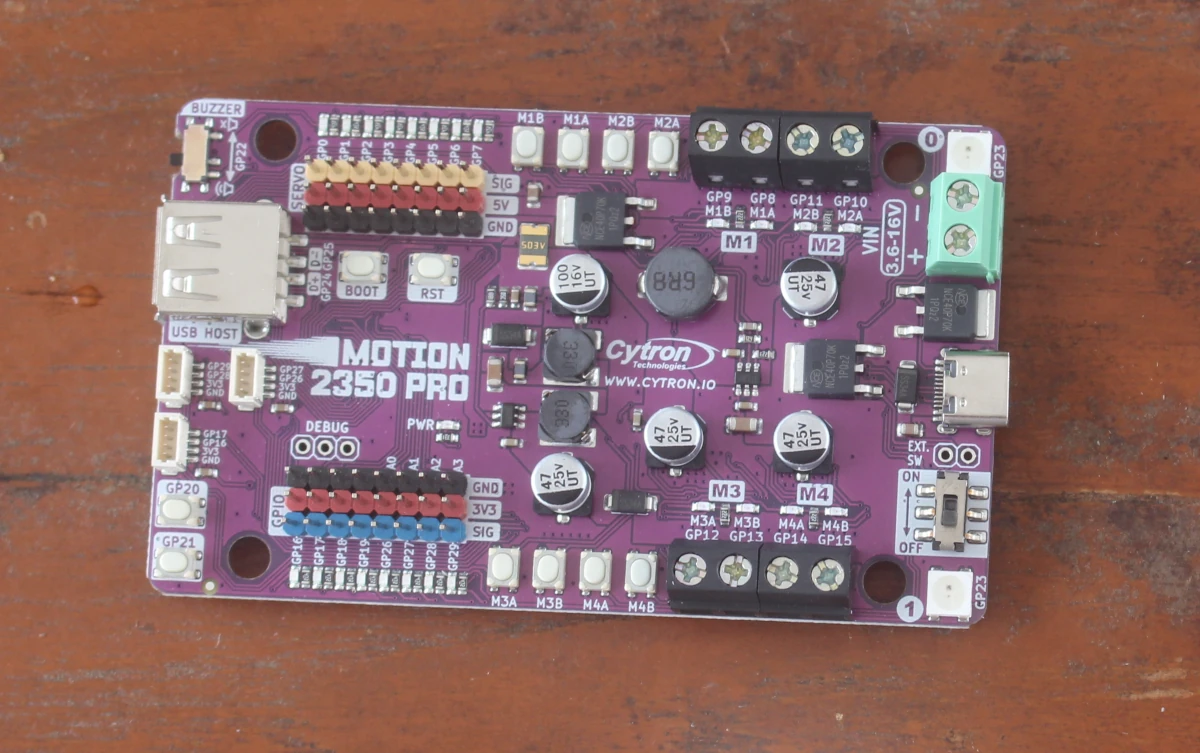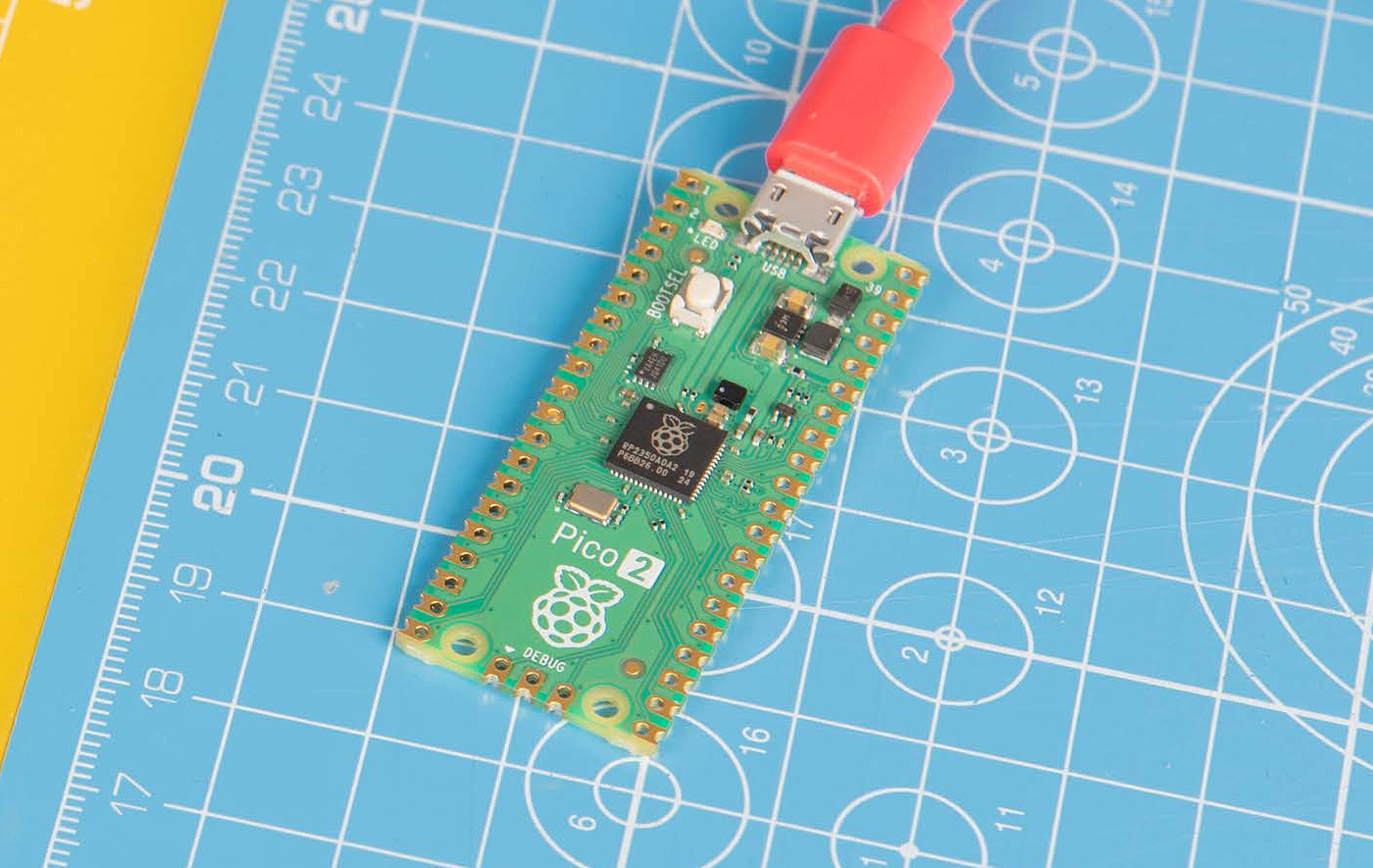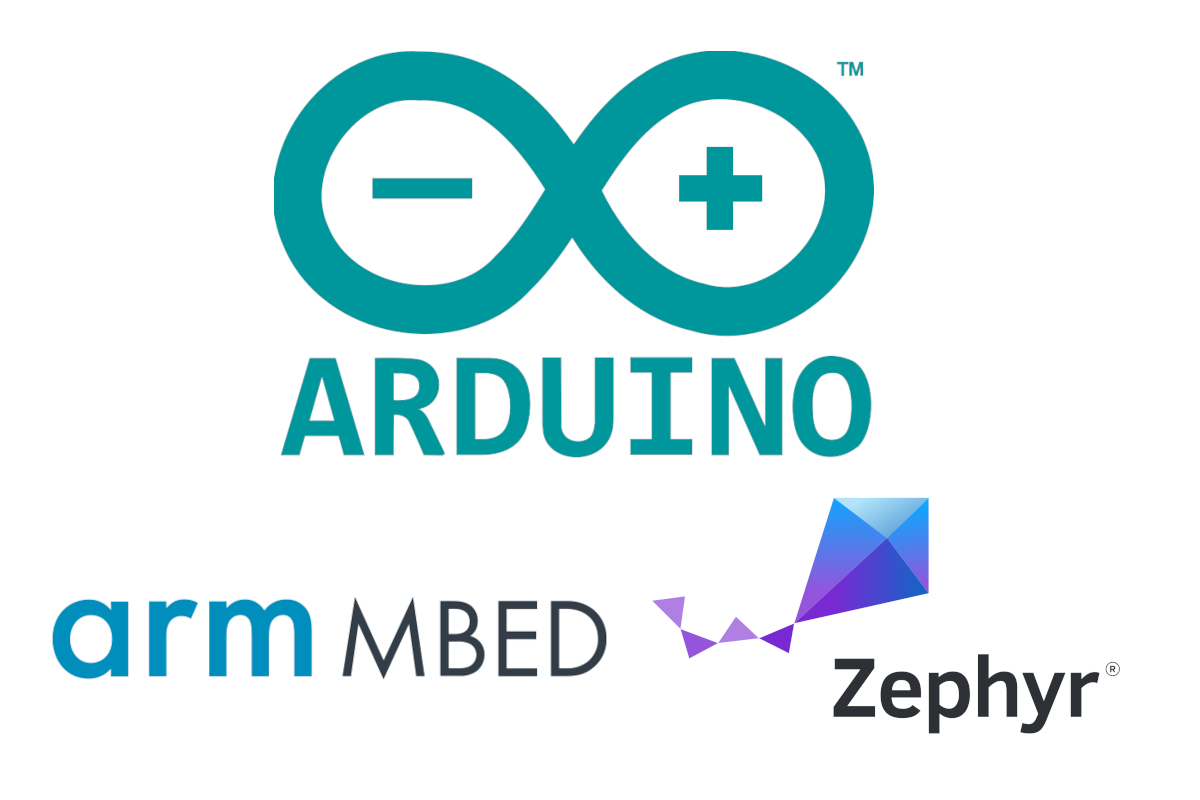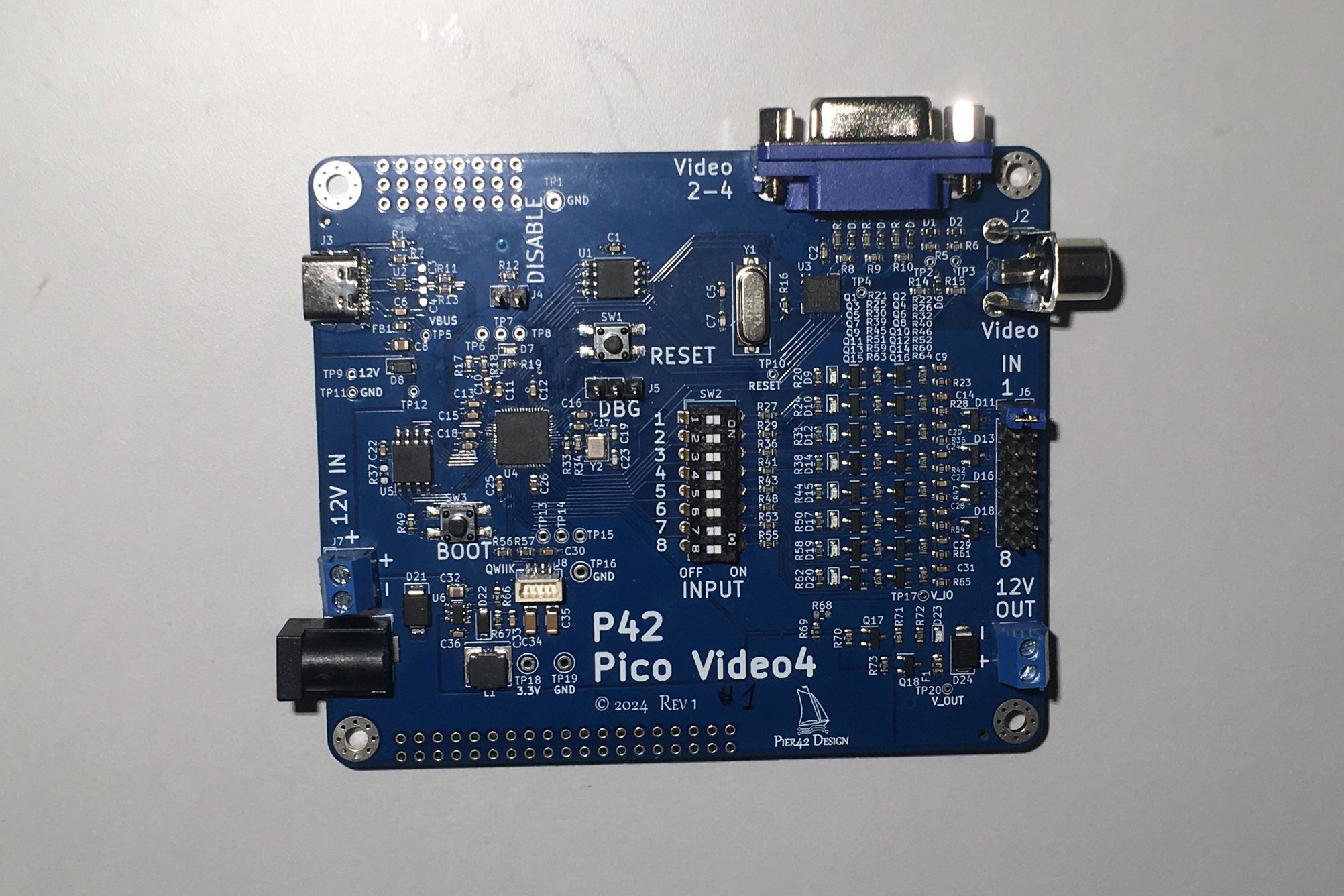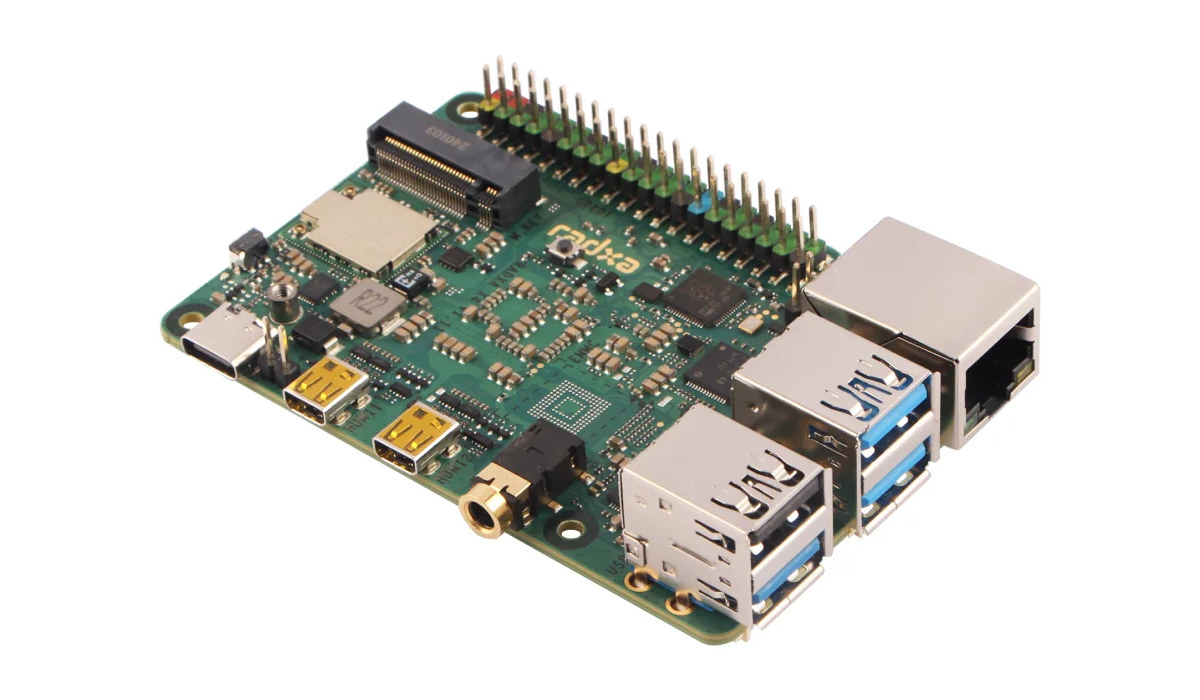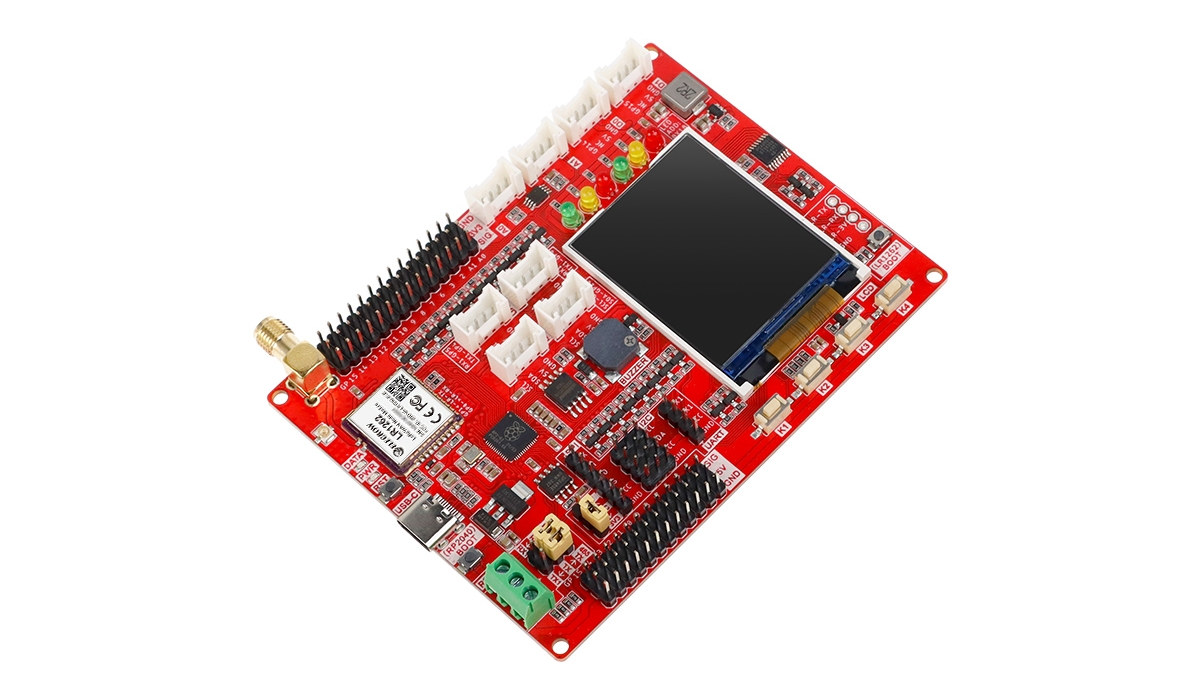The XIAO RP2350 is an upgrade to Seeed Studio’s XIAO RP2040 board with a more powerful Raspberry Pi RP2350 dual-core Cortex-M33 or dual-core RISC-V microcontroller found in the just-launched Raspberry Pi Pico 2 board. The new Raspberry Pi RP2350 USB-C board has the same form factor but adds eight more GPIOs on the bottom with pads for a total of 19 GPIOs, and we lose two LEDs for serial port connectivity. Most people will still be fine with the XIAO RP2040, but if you need a more powerful microcontroller, extra memory, a few extra GPIOs, and built-in security, then the XIAO RP2350 will be an improvement. XIAO RP2350 specifications: Microcontroller – Raspberry Pi RP2350 MCU CPU – Dual-core Arm Cortex-M33 processor @ 150MHz (Note: again RISC-V is not mentioned at all by Seeed Studio, like for the Cytron MOTION 2350 Pro board) Memory – 520KB internal RAM 8KB OTP Storage […]
Cytron MOTION 2350 Pro – A Raspberry Pi RP2350 board for robotics and motor control
As mentioned in the Raspberry Pi Pico 2 article, third-party RP2350 boards are already available, and one of them is the MOTION 2350 Pro board from Cytron designed for robotics and motor control. The board features a DC motor driver capable of controlling up to 4 brushed DC motors with voltage ratings from 3.6V to 16V. It also features eight 5V servo ports, eight GPIO ports, and three Maker ports for sensor or actuator modules. Each I/O is matched with its own LED which makes the board ideal for the education market and also simplifies debugging. Finally, a USB 1.1 host port is present to connect peripherals such as the RF dongle for a joystick or a keyboard. Cytron MOTION 2350 Pro specifications: Microcontroller – Raspberry Pi RP2350 CPU – Dual-core Arm Cortex-M33 processor @ 150MHz (RISC-V cores are not mentioned, so they are likely not used at all) Memory […]
$5 Raspberry Pi Pico 2 launched with Raspberry Pi RP2350 dual-core RISC-V or Arm Cortex-M33 microcontroller
The Raspberry Pi Pico 2 is an MCU development board based on the new Raspberry Pi RP2350 dual-core RISC-V or dual-core Cortex-M33 microcontroller with 520 KB on-chip SRAM, a 4MB flash, a micro USB port for power and programming and the same GPIO headers as the Raspberry Pi Pico board with an RP2040 dual-core Cortex-M0+ microcontroller with 264KB SRAM. The RP2350 embeds both an open-source Hazard3 RISC-V dual-core CPU and a dual-core Cortex-M33, but only one cluster can be used at a given time. Apart from the faster MCU cores and higher SRAM capacity, the RP2350 is about the same as the RP2040, albeit it also adds one extra PIO block bringing the total to three. One important new feature is built-in security when using Arm Cortex-M33 cores with Trustzone and other security features. Raspberry Pi RP2350 microcontroller Let’s have a closer look at the RP2350 microcontroller, before checking out […]
Arduino to switch from Arm Mbed to Zephyr RTOS
Following Arm’s decision to stop supporting Mbed from July 2026 onwards, Arduino has now decided to use Zephyr RTOS instead of Arm Mbed for Arduino boards that rely on the latter including Arduino GIGA, Arduino Nano 33 BLE, Arduino Nano RP2040 Connect, as well as Arduino PRO boards/solutions such as the Portenta, Nicla, and Opta families. Note that Arduino UNO, MKR, and Nano families are not impacted by the change since their Arduino Core implementation does not rely on Mbed. The change is not going to happen overnight as software development takes time, and Arduino plans to release the first beta based on ZephyrOS by the end of 2024. and a rollout for various boards starting in 2025 long before Arm Mbed is phased out for good. Arduino is not new to the Zephyr project as the company became a Silver member last year, and they were aware that Arm […]
Raspberry Pi RP2040-based Pico Video4 display board features 4 composite video outputs
The Pico Video4 Display is a Raspberry Pi RP2040-powered board that supports up to 4 analog composite video display interfaces with dedicated frame buffer memory accessible via SPI. The four video outputs are sent out through an RCA connector and a VGA DB15-HD connector that uses the red, green, and blue channels to create a composite video signal. The Pico Video4 Display is based on the Raspberry Pi RP2040 microcontroller chip and the VLSI VS23S040 four-megabit static RAM device with a video display controller that can output NTSC, PAL, and VGA video from the memory array. It provides the composite video outputs with a dedicated frame buffer and other hardware. This ensures that the RP2040’s limited processing power and memory are not hogged up in generating the video signal, leaving room for other major tasks. It has 8 inputs that are voltage-compatible to the input voltage, from 5V to 12 […]
Radxa X4 low-cost, credit card-sized Intel N100 SBC goes for $60 and up
Radxa X4 is a credit card-sized Intel Processor N100 single board computer (SBC) that costs almost the same as a Raspberry Pi 5 with the 4GB RAM model going for about $60 and the 8GB RAM variant around $80. The x86 SBC offers many of the same features as the Raspberry Pi 5 including dual micro HDMI output, four USB 3.2/2.0 ports, Ethernet and WiFi networking, and the 40-pin GPIO header handled through a Raspberry Pi RP2040 microcontroller. Networking is better with 2.5GbE and WiFi 6, M.2 SSD support is built-in and four to eight times faster compared to PCIe HAT for the Pi 5, and the USB 3.2 ports are capable of 10 Gbps speed. So let’s little not too like, and the main downside is the lack of MIPI CSI and DSI connectors for projects requiring those camera and display interfaces. Radxa X4 specifications: SoC – Intel Processor […]
Elecrow LR1262 development board combines Raspberry Pi RP2040, SX1262 LoRaWAN module, and 1.8-inch LCD
Elecrow LR1262 development board combines a Raspberry Pi RP2040 microcontroller with the company’s LR1262 LoRaWAN module based on STM32WL LoRa SoC with support for 868 and 915 MHz frequency bands, and a 1.8-inch LCD. The board also offers an RS485 terminal block to connect sensors and actuators, plenty of connectors and headers for further expansion, several buttons for user control, and LEDs for debugging/monitoring. Elecrow LR1262 development board specifications: MCU – Raspberry Pi RP2040 dual-core Arm Cortex-M0+ @ 133MHz built-in 264KB SRAM Storage – 4MB flash Display – 1.8-inch 128×160 TFT LCD using ST7735S 4-wire SPI driver Wireless – Elecrow LR1262 LoRaWAN module MCU – STMicro STM32WLE5CCU6 Arm Cortex-M4 32-bit, 256 KB Flash, 64KB RAM RF transceiver – Semtech LX1262 Frequency band – 150 MHz to 930 MHz (Note: the board itself is advertised as supporting 803MHz to 930MHz: IN865, EU868, AU915, US915, KR920, RU864, and AS923) LoRaWAN protocol – […]
Olimex NEO6502 is a W65C02 and Raspberry Pi RP2040-powered retro computer with HDMI, USB, and more
Olimex has recently launched NEO6502 an open-source hardware retro computer designed for educational and entertainment purposes, but that doesn’t mean it can’t be used for retro gaming. The board is very unique as it’s built around a 65C02 MPU and Raspberry Pi Pico RP2040 MCU in a dual-processor configuration. The MOS6502 handles the Apple II, Oric, and Commodore 64 emulators whereas the RP2040 handles everything else including HDMI (DVI) video output using the PicoDVI project. Previously we have written about similar retro computer kits such as the CERBERUS 2100, TinyLlama x86, DevTerm with ClockworkPi v3.14, Olimex AgonLight2, and many others feel free to check those out if you are interested in retro tech with a modern twist. Olimex NEO6502 board specifications Processors Western Design Center W65C02S 8-bit microprocessor @ 6.25 MHz with 64kB RAM, 32kB Graphics RAM Raspberry Pi RP2040 dual-core Cortex-M0+ MCU @ 133 MHz with 264 KB SRAM Storage […]


